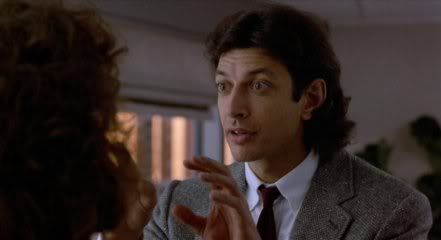
"Is this a romance we're having? Is that what it is?" - SETH BRUNDLE, a brilliant but socially awkward scientist who's working on something that will change the world and human life as we know it
Mainstream horror cinema was in a bad way in the mid-'80s. Following the boffo box office of Halloween in 1978 and especially Friday the 13th in 1980, theaters (and video store shelves) were soon glutted with imitation slasher flicks about masked maniacs stalking frequently unclothed young women and hacking them to pieces with assorted kitchen utensils and gardening tools. This is, of course, not to forget the innumerable sequels these films engendered, few of which existed for anything other than mercenary reasons. This trend was also occasioned by a veritable race to the bottom with makeup artists of all skill levels competing to see who could devise the most nauseating gore effects which, more often than not, had to get cut back significantly in order for the films in which they appeared to get the all-important "R" rating. (This was well before the vogue for "unrated" video releases, so if something didn't cut the muster with the MPAA it generally wouldn't get seen outside of the grindhouses and urban markets.)
This is, of course, not to suggest that all was doom and gloom. Discriminating horror fans who dug a little deeper were rewarded with the occasional gem, and there were certain directors who could be counted on to deliver the genre goods while still treating their subjects with a certain amount of intelligence. One such director was Canadian auteur David Cronenberg, who had started making a name for himself a decade earlier with a low-budget film called Shivers, which was renamed They Came from Within when it was released in the States and caused a stir among horror aficionados. Over the next few years he followed it with Rabid (the legitimate acting debut of Behind the Green Door star Marilyn Chambers), The Brood (which was identified as a cult movie by no less an authority than Danny Peary) and Scanners (which was his commercial breakthrough in the American market). Being number one at the box office for one weekend (as Scanners was) brought Cronenberg to the attention of Hollywood and thus began the process of introducing his work to a wider audience. Of course, a major part of that would involve downplaying the extreme imagery (like the phallic organ in Chambers's armpit in Rabid or the exploding head in Scanners) that punctuated Cronenberg's films. What appealed to the Fangoria crowd wouldn't necessarily fly with general audiences -- not without some help.
The first fruits of the uneasy alliance between Cronenberg and Hollywood came in form of Videodrome, which was co-financed by Universal. I'm not sure how Cronenberg was able to sell the studio on the concept, but the resulting film would have probably been the most appallingly violent thing they put out at the time if it hadn't been for John Carpenter's remake of The Thing, which had come out the summer before. (An interesting side note: the Criterion edition of Videodrome features a roundtable discussion from 1982 with Cronenberg, Carpenter and John Landis, whose An American Werewolf in London was released by Universal the year before. It's hard to think of a more disparate group of directors all working under the same umbrella, but the early '80s was a strange time for studio filmmaking.) Even with the backing of a major studio (which Cronenberg hadn't had when The Brood was shorn of one of its more grotesque moments a few years earlier), Videodrome suffered some MPAA-mandated cuts, not just for its violence but also for its sexual content, which had never really been an issue with Cronenberg's films up to that point. (Not even Rabid, which, for a film with an ex-porn star in the lead, is remarkably chaste.)
As if in response to Videodrome's poor reception (like a lot of Cronenberg's films, it's gone on to have a cult following, but at the time of its release it was a box office dud), the director's next film was a much more commercial prospect all around. Based on a novel by Stephen King, The Dead Zone not only dialed way back on the blood and gore that Cronenberg was known for, but it also featured the first realistically rendered romantic coupling (between Christopher Walken and Brooke Adams) in one of his films. (In contrast, the sex scenes between Videodrome's James Woods and Deborah Harry are anything but romantic.) Then, following a lengthy detour where he worked on a version of Total Recall for producer Dino De Laurentiis that was ultimately abandoned over "creative differences" (Cronenberg wanted to be creative, De Laurentiis apparently did not), he was offered the film that finally consummated his flirtation with the mainstream: the 1986 remake of The Fly.
Over the course of this year-long project, Joe and I have tried to tackle a variety of styles and genres, from high-toned art-house fare to knockabout farces, from superhero sequels to would-be cult movies, from films aimed at children to decidedly more adult entertainment. And in terms of the filmmakers, we've tried to cast our net wide, covering everyone from Robert Zemeckis to the Chiodo Brothers and from John Hughes to Steven Spielberg. Even so, we've managed to repeat ourselves, touching on multiple films by Zucker-Abrahams-Zucker (Ruthless People and Top Secret!) and Frank Oz (The Muppets Take Manhattan and Little Shop of Horrors). And now we're taking on our second film (after The Elephant Man) from Mel Brooks's Brooksfilms, which worked hard to differentiate itself from the popular director's own output (which would have also been worth exploring even if the '80s weren't as kind to Brooks as they might have been).
If Mel Brooks and David Cronenberg seem unlikely bedfellows, they're no stranger than Brooks and David Lynch, whose earlier collaboration resulted in critical acclaim, multiple Oscar nominations (including Best Picture and Best Director) and Lynch's emergence from the underground which had nurtured him for many years into the realm of commercial filmmaking. Admittedly, Cronenberg didn't have as much of a leap to make in that regard and The Fly only received one Academy Award nomination, but unlike The Elephant Man (which went 0 for 8), it won the Oscar for Chris Walas's groundbreaking makeup effects. That Jeff Goldblum -- the man who had to endure most of them and give a credible performance as an emotionally stunted scientist-turned-gradually evolving genetic mutation -- didn't take home Best Actor (let alone even get nominated) is a travesty. (His Saturn Award -- given out by the Academy of Science Fiction, Fantasy & Horror Films -- was a small consolation considering it was given to Jack Nicholson for his over-the-top turn in The Witches of Eastwick the following year.)
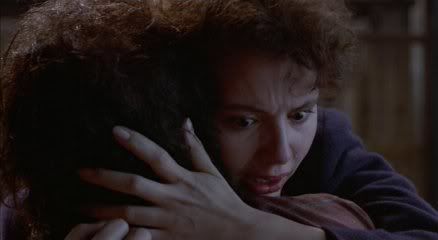
In the acting department, Geena Davis matches Goldblum every step of the way as Veronica Quaife, the ambitious science journalist who sees the potential in his pioneering teleportation work first (she wants to write a book about it) and their potential as a couple second. (They were a couple in real life by this time as well, having met while making the utterly forgettable monster comedy Transylvania 6-5000, which was written and directed by erstwhile Mel Brooks collaborator Rudy De Luca.) The only other major character is Veronica's editor/slimy ex-boyfriend Stathis Borans (notice how he shares the same initials as Seth Brundle) who's indelibly played by John Getz (currently appearing on multiplex screens nationwide as Mark Zuckerberg's lawyer in The Social Network). Cronenberg and Getz walk a fine line with Stathis since they don't even attempt to make him likable, yet he never comes off as an outright villain, either. If this were an ordinary domestic drama, he would play the part exactly the same (although his line "I don't want you to disappear from my line" carries extra resonance in a story about the dangers of being teleported from one place to another). The only difference is he probably wouldn't sit by screaming while his hand and foot are dissolved by an acid-spewing half-man/half-insect creature. (It would be wrong to rule that out entirely.)
The screenplay -- which is credited to Cronenberg and original screenwriter Charles Edward Pogue even though it retains only a handful of Pogue's ideas (it was his idea for the fusion to be at the genetic level) and none of his dialogue or characters -- is a marvel of efficiency, introducing the situation swiftly and succinctly and packing in loads of quirky details about the protagonists (like Seth's pride in his espresso maker or Stathis's penchant for dropping by unannounced to use Veronica's shower because he "just happened to be in the neighborhood" and "felt a bit scummy"). It also allows them to rise to the level of their intelligence (which means they don't talk down to the audience or make dumb decisions just for the sake of moving the plot along) and maintain a sense of humor throughout. (Even as he's slowly turning into something hideous and unmistakably inhuman, Seth continues to make wry observations about the situation he finds himself in.) And Cronenberg gets to play up some of his pet themes, particularly about "the flesh," which may very well be related to Videodrome's "New Flesh." This comes out in a big way after Seth has teleported himself (and a housefly, although he doesn't know that yet) and is outraged that Veronica refuses to follow in his footsteps:
You're afraid to dive into the plasma pool, aren't you? You're afraid to be destroyed and recreated, aren't you? I'll bet you think that you woke me up about the flesh, don't you? But you only know society's straight line about the flesh. You can't penetrate beyond society's sick, gray fear of the flesh. Drink deep or taste not the plasma spring! See what I'm saying? I'm not just talking about sex and penetration. I'm talking about penetration beyond the veil of the flesh -- a deep, penetrating dive into the plasma pool.With an invitation like that, who wouldn't want to take a dip?
Of course, it isn't long before Seth's physical condition deteriorates -- his face becomes blotchy and his fingernails start coming off, prompting him to don heavy gloves so he can continue typing confused queries into his computer -- and for the rest of the film (usually when Veronica drops by to check up on him since he has no other contacts with the outside world) we get to see him at various stages of his chilling metamorphosis. ("Every time I look in the mirror there's someone different, someone hideous, repulsive.") At one point hobbled to such a degree that he needs to use canes to get around, later on Seth discovers a talent for walking on the ceiling and walls ("I seem to be stricken by a disease with a purpose, wouldn't you say?") that brings back the strange euphoria he felt when he turned into a world-class gymnast overnight. The more Seth embraces his new body, though, the more it repulses Veronica. No wonder she freaks out when she discovers she's pregnant since she has no way of knowing whether the baby she's carrying was conceived before or after Seth teleported himself. This is the cue for what is probably the most upsetting scene in the film to female viewers, and the one that pointed the way to Cronenberg's next film, Dead Ringers, since he has a cameo as a gynecologist who helps Veronica deliver what turns out to be a squirmy, wriggling larva. This turns out to only be a nightmare, but it prompts Veronica to go to Stathis so he can pull some strings and get her an emergency abortion.
"I don't want it in my body," she cries and in many ways that sums up Cronenberg's unique brand of "body horror" that can be traced all the way back to his early, experimental features Stereo and Crimes of the Future (from 1969 and 1970, respectively). This time, though, we're not watching dispassionately as an academic type explains what's happening in voice over. Rather, we're right there on the front lines with the characters as they wrestle with their emotions -- even Seth, who has started calling himself Brundlefly, makes an impassioned plea for her to keep the baby because it may be the only human part of him left. (When was the last time you saw a monster movie morph into a sensitive abortion drama?) His insect side wins out, though, and he puts into motion one last teleportation experiment, hoping that the fusion of his DNA with Veronica's and their child's will result in a being that is decidedly more human than what he's turning into. ("We'll be the ultimate family," he quips, echoing his earlier argument that they would be "the perfect couple" if only she would let him send her through the teleporter.) In the end Brundlefly is thwarted by his romantic rival, Stathis, who turns out to be the film's unlikely hero, but at the cost of his foot and hand. Unsurprisingly, he's more than a little bitter about this in his one-scene cameo in the Cronenberg-less sequel, The Fly II, which was released in 1989 and proved that some scientific experiments just can't be replicated.
That said, it's no real surprise that -- with the help of his regular collaborator Howard Score, who composed the film's haunting score -- Cronenberg was able to turn The Fly into an opera (the premiere of which he directed in 2008). Even with its science-fiction trappings and monster-movie origins, it's still at its base a story about a love triangle that is only resolved when one of the lovers comes to a violent (and sadly necessary) end. But unlike Little Shop of Horrors, which went from film to stage musical then back to film, there's little chance that The Fly will be returning to the screen in its new form. That, I expect, would be one mutation too many.
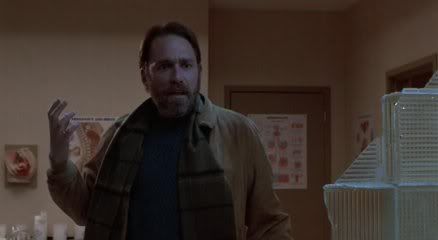
Jeff Goldblum is one of those actors who works all the time (as he should; he's terrific), but his career leaves you to wonder how Hollywood keeps coming up with stuff for this guy to do. This is one seriously odd individual, possessing unmistakable physical and vocal tics that are perfect for impressionists. They don't even have to exaggerate. A quick YouTube search, for instance, brings up a clip called Elon Gold interviewing Elon as Jeff Goldblum, which as luck would have it actually incorporates some dialogue from this week's movie, The Fly ("Look at me! Let's go! Catch me if you can!") and pretty much covers all the Goldblum basics. Jeff speaks in an excited, rapid-fire manner but pauses at uncomfortable times, emphasizes unexpected words, and sometimes has to use "uh" as a placeholder when his mouth can't quite keep up with his mind. Plus he stares intently at you with those buggy eyes of his and seems to be smiling at some deeply private joke no one else could ever understand. You're never quite comfortable when you're talking to him. He throws your rhythm off somehow. If anything, he seems to try to downplay these tendencies in most of his "normal" acting. In interviews, though, he really lets loose. One need only venture as far as the supplemental materials on the exhaustive Fly special edition DVD to see some full-tilt Goldblum action. Film critic Jami Bernard deftly summarized the actor's demeanor in her book, First Films:
"Jeff Goldblum is so intense that when he first shakes your hand, he holds it just a beat too long, peering at you unblinking with those giant orbs, cocking his head as if trying to sniff you or lock into you through some astral frequency. His ears move sometimes when he talks, adding to the impression that Goldblum is possessed of psychic antennae, and although he can appear gangly on-screen, he is well built and powerfully kept."I include that paragraph because one could fairly easily take out Jeff Goldblum's name and substitute Seth Brundle's and it would still manifestly apply. Could it be that the doomed scientist of The Fly is the role which gets closest to the "real" Jeff Goldlbum? At the risk of sounding like an armchair psychologist, I'll say yes. Let's face it: even before he starts transforming into an increasingly yucky human-fly hybrid (flybrid?), Seth Brundle already seems like an extra-terrestrial, perhaps an amped-up first cousin to David Bowie's slumming alien Thomas Jerome Newton from The Man Who Fell to Earth. Notice that both Brundle and Newton are uncomfortable in cars and insist that whoever's driving go slowly. (Incidentally, I've heard the same thing about Stanley Kubrick. Makes you wonder, huh?) Furthermore, Brundle chooses as his pet a baboon, i.e. a dangerous creature which can definitely not be domesticated, takes his fashion cues from Albert Einstein, makes his home in a warehouse in a really crappy-looking neighborhood, and seems like a possible Asperger case when it comes to social interaction. Brundle seems to regard humanity and life itself with a kind of eerily distant fascination, the way we actually regard the insect world. We can study the insect world and ask all the relevant questions, but we'll never be able to "think" like an ant or a grasshopper. Or a fly.
One habit of Brundle's that continues throughout the movie is his penchant for posing questions aloud that most of us would just think. Craig started off this article with a good one: "Is this a romance?" Maybe not the best thing to ask your (likely first and only) girlfriend, but Brundle literally doesn't know. He's maybe heard of this "romance" thing, but he's not sure how it actually works. When that same girlfriend, ambitious reporter Veronica (Geena Davis), tells Brundle he's cute, he replies, "Am I?" In most cases, this would be coy, false modesty. But Brundle is genuinely, pleasantly surprised to hear the news. He honestly doesn't know what human women find cute. At this moment, Brundle is like someone who wins a contest he didn't even know he'd entered. When that pesky insect DNA starts running rampant and Brundle's health deteriorates: he asks his (none-too-promising) reflection in the mirror, "Am I dying? Is this how it starts?" This moment is partly a soliloquy, as Cronenberg's film is definitely a Tragedy with a capital T, but there's also some genuine scientific curiosity behind Brundle's words. He's of course horrified and saddened by his alarming decline into fly-dom, but the "scientist" part of his brain still finds it fascinating. I guess that's why, as he gets worse and worse, he stays pretty zen about his dismal situation and even takes pains to document his disgusting metamorphosis.
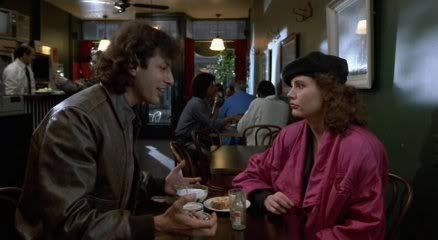
That last scene I mentioned, the excruciating sequence with Brundle in front of the bathroom mirror, is painful to watch for two reasons. It's yucky, certainly. No denying that. But it's also emotionally devastating. That's the key to what makes The Fly such a powerful viewing experience. Cronenberg brought real feeling back to the horror film. He re-personalized a genre that was becoming less and less personal with each Jason or Freddy sequel. In a weird way, that makes The Fly a throwback to an earlier era. Go back to those old Universal horror flicks, and you know what you'll find? A lot of relationship drama -- parent/child relationships, of course, but romantic entanglements as well. The various and sundry vampires, werewolves, mad scientists, monsters, and invisible men who populate these films generally go through some heavy relationship problems during the course of their films. It's not just about the violence; it's about the lives that are affected. (Imagine being Dr. Frankenstein's fiancée for a moment. That's a tough gig.) And, as Cronenberg points out in his DVD commentary, take all the sci-fi stuff about teleportation and DNA out of The Fly and you have the very human story of a woman who meets and falls in love with a man and watches in shock and horror as he succumbs to illness or addiction before finally begging to be put out of his misery. Without the sci-fi/horror trappings, this would be a profoundly unmarketable story. But that's what's so wonderful about these genres. They provide a commercial "safety net" which allows filmmakers like David Cronenberg the chance to try things that would be unheard of in, say, a straight drama.
Or at least ideally that's how it should work. This is the point in the article where I go into my obligatory, grouchy-old-man rant about "the rotten movies they're making nowadays." I seem to be doing that more and more, and I apologize for that, but I can't avoid the issue. One question that's been on my mind since we started this project is: "Are the movies of the 1980s better than the movies we're getting in 2010?" I'd have to say that in terms of mainstream American movies -- the kind released by major studios and shipped out to multiplexes across the country, the kind people really see -- the answer is generally yes. Movies were trying a lot harder in the '80s. The only way that movies have gotten more "ambitious" in the ensuing decades is in purely technical terms. The effects budgets keep getting bigger, but the ideas are smaller than ever. We're not getting intricately crafted farces like Ruthless People, bracing satires like The Meaning of Life or truly shattering tragedies like The Fly. We're aiming so low on the emotional and intellectual scales these days. It seems like the only directors who can do anything really meaningful or interesting "within the system" these days are those who have become trusted brand names in their own right and are allowed to flex some creative muscle. But those guys (generally) aren't making horror films in 2010, and we have to settle for the work of best-left-anonymous studio hacks. We have this genre with tremendous dramatic potential, and it's lying fallow. Someone write a Congressman!
Before you do that, though, go back and watch The Fly again, especially if you haven't seen it in a while. You'll laugh! (Like when Seth goes on a motormouthed tear at a coffee shop as an embarrassed Veronica looks on.) You'll gasp in surprise. (Oh, god, that arm wrestling scene!) You might even cry. (Especially during the film's grueling last half hour.) It's that kind of picture. It's no coincidence that I also brought up the classic Universal films when I discussed our last Brooksfilm production, The Elephant Man because in a weird way Elephant and Fly feel like companion pieces to me: a human soul trapped in an animal-like body. Mel Brooks used to aim for the rafters as both a director and a producer, culminating with Young Frankenstein, a movie which aims not only for laughs but for genuine emotion. By the end of a great Brooks flick, the audience should feel as if it's gone through a whole range of feelings. But somewhere around Robin Hood: Men in Tights Mel started thinking smaller and smaller, too, eventually making himself irrelevant. A pity.
But before all that unpleasantness happened, Mel ponied up the dough for this movie. May the Schwartz be with him for that, if nothing else. The Fly is a real Rorschach test of a movie. Could be about cancer. Some think it's about AIDS. Could be that old "tampering in God's domain" bit. (Horror films still aren't done with that one. Not by a damned sight. Wasn't Splice just a few months ago?) To me, the terrifying saga of Seth Brundle works best as a movie about drug addiction, most likely cocaine. Cronenberg mentions coke specifically on the commentary track. During that aforementioned scene in the coffeehouse, Seth adds spoonful after spoonful of sugar to his coffee and becomes a serious "junk food junkie" as the film progresses. Of course, flies like sugar and sweet stuff. But supposedly so do druggies. Having never really been close to the drug scene, I can only rely on what the movies have told me. Remember Jodie Foster as strung-out teen prostitute Iris in Taxi Driver? Well, there's a scene where she's in a cafe with Robert De Niro, having breakfast, and she puts a lot of jelly on her toast and then pours sugar on top of the jelly. According to Taxi Driver screenwriter Paul Schrader, that detail was taken directly from real-life observation. Junkies, like flies, dig sugar.
Good enough for me.
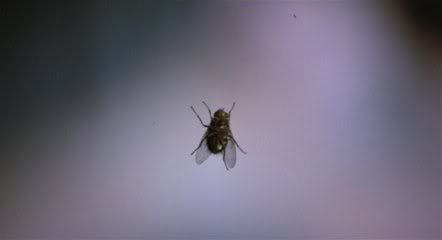
Up Next: The sad story of a fledgling perfume company which must close its doors and stop making scents. Or something like that.

Leave a comment